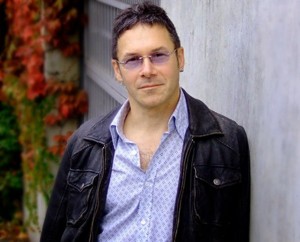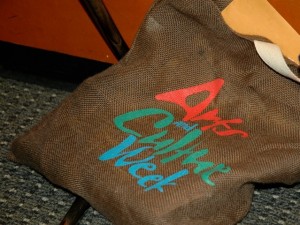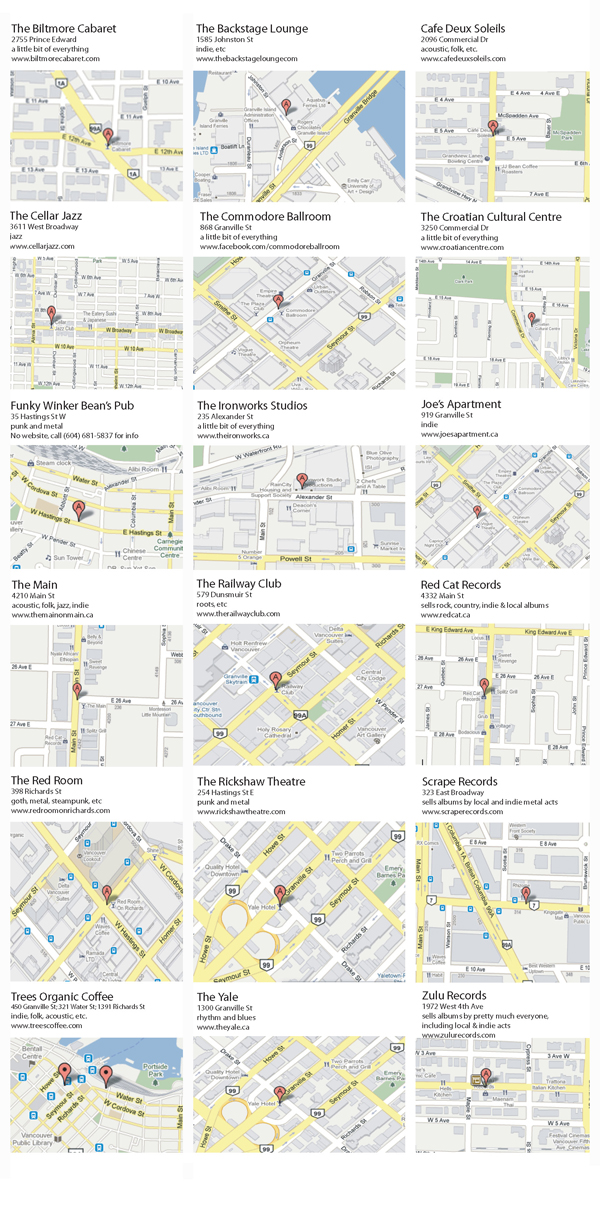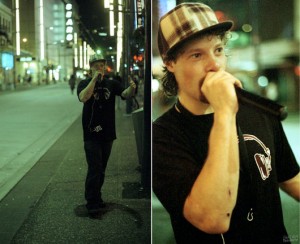Vancouver journalist helping university students with guidebook
April 12, 2011 by Kyle Benning · Leave a Comment
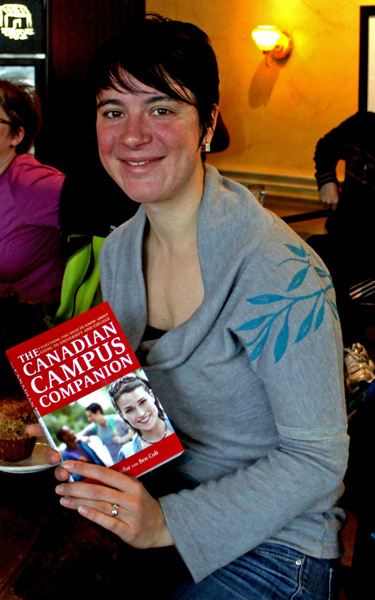
Erin Millar knows too well what it is like to adjust to the post-secondary lifestyle. (Photo by Kyle Benning)
Going into college, Erin Millar thought she was going to be a music teacher.
Now, the Capilano graduate has written The Canadian Campus Companion, a guidebook on going onto post-secondary education in Canada.
The freelance journalist was president of Canadian University Press (CUP) during her time as an editor at the Capilano Courier.
“I really enjoyed [writing] and found my real calling [in journalism],” Millar said.
Millar, who generally writes feature stories, was the first person in her family that attended a post-secondary institution, and she said she learned a lot about the university lifestyle when she moved away from home.
”I remember I moved from Penticton to Vancouver for the first time when I was 18 years old, like everybody else does. It was really challenging. I didn’t know how to do anything. Cap doesn’t have residence, so I had to move into my own place,” Millar said.
“I didn’t even know enough about registering to realize that I had to register myself for English 100. I just sort of assumed I’d show up and I would go to my classes and my program was very set because I was in a very specific program. I didn’t even get all the classes I needed in my first year because I didn’t really realize the process,” Millar said.
Millar co-wrote the book with Ben Coli, her husband, whom she met in Thailand while doing freelance journalism.
“[Coli] went to business school at U of C and worked for a couple years as a property tax consultant and realized that what he really wanted to do was write,” Millar said. “I think we both kind of came at it from other sides, and I think that message is very much in the book to keep your ears open and follow what you really enjoy and it doesn’t necessarily have to be what you expect.”
Millar and Coli got the book deal two days before their April wedding. They started writing the book late, and their deadline was set for Sept. 30 so they could have it on shelves for this spring.
“I feel like the book is a lot better having written it together,” Millar said.
She said that there aren’t many university guidebooks for Canadian institutions and that her book, The Canadian Campus Companion, is the most in-depth university guidebook in the country.
After graduating, Millar found that her passion for writing and journalism was more tempting than a career as a music teacher. She was hired to work full-time by McLean’s Magazine helping with the on-campus website and the university rankings.
Even though she didn’t follow through with her original dream to teach music, Millar keeps her alto saxophone and piano close to her. Millar and her sister are part of a cover band that has been together for seven years.
Pi Theatre: Blending local and international artists in one production
February 27, 2011 by Meagan Gill · Leave a Comment
In a society where everyone is consumed by some kind of electronic device, sitting down in a theatre with a group of strangers to watch a play is the ultimate communal experience.
“It’s about the people your sitting beside, breathing the same air as the people on stage, sharing the same moments at the same time and influencing each other,” said Richard Wolfe, artistic director of Pi Theatre. “You can tell when someone is feeling tense about a moment, you can kinda sense it. I think the more digitized society becomes, the more important that kind of contact will be.”
Wolfe describes a recent bus ride, where practically everyone was looking down at their phone texting or listening to their iPod, not really paying attention to all of the people that surround them. He says people become engaged in these devices but that theatre is all about human interaction and communication.
Wolfe has always had a love for theatre and an interest in human communication. “Theatre is really all about human interaction, human challenges, aspirations and family. It’s a formalized portrayal of human life.”
Pi Theatre is an independent theatre company located in Vancouver. It produces local and international contemporary plays that are dynamic, exciting and provocative. Wolfe has been the artistic director of Pi Theatre for three years. Before that, he was the co-founder, director and co-artistic producer of Theatre Conspiracy for 12 years.
Theatre Conspiracy was similar to Pi Theatre in the way that they both look at international artists, as well as local. They did Canadian premieres of many major international plays, which include Wil Eno’s Thom Pain, Penhall’s Blue/Orange and Jez Butterworth’s Mojo. He chose to leave Theatre Conspiracy and become the artistic director of Pi Theatre because funding was more stable. At Theatre Conspiracy, they were paid project-to-project whereas at Pi Theatre, his job is salary-based.
Wolfe has received 30 nominations for Outstanding Artistic Achievement for his productions in Vancouver. He won two awards, for Outstanding Ensemble Cast, and has been nominated for Outstanding Director three times.
Wolfe got his MFA at UBC. He says his inspiration comes from his teachers, well-established artists, and from the people he works with. “Everybody that you come into contact with at different points in your life will have an impact on you in one way or another.”
He describes Vancouver’s theatre scene as healthy because there are a lot of creative artists here and schools that offer theatre programs. “People are being trained, and they’re being put into the community and all of that energy produces good things,” said Wolfe.
According to Wolfe, the biggest challenge facing independent theatre companies is funding.
“The provincial government isn’t pulling their weight but the current administrative of the city is very pro-arts and culture because they understand that the creative economy is essentially important in the larger economic picture,” he said. “But with the provincial government, after arts and culture played such a huge role in the Olympics, coincidently or not, right after the Olympics were over, they cut all the funding.”
He says his long-term goal for Pi Theatre is to increase the programming and keep it in a financially stable position. He also wants to continue building its profile as a playwright-centred theatre company that deals with the best contemporary playwrights.
To Wolfe, the most important thing in theatre is to “look at the world we live, in a very strong and individual way that speaks to the audience, whether they’re from here or not,” he said. “Certainly it’s important to develop local writers and to juxtapose those writers and the plays they write with international plays so that we can have a bigger picture of the world and of the art.”
To learn more about Pi Theatre, visit the website.
Slideshow: local filmmakers bring Dungeons & Dragons to life
February 17, 2011 by Amanda Punshon · 2 Comments
Photos and audio from the filming of Standard Action episode four at the Fish House restaurant in Stanley Park, Vancouver on Jan. 31. The series, created by local actor Joanna Gaskell, takes place in the universe of a role-playing game similar to that of Dungeons & Dragons. Episodes one through three are online now.
Twenty-Something Theatre: Giving young talent a chance
February 14, 2011 by Meagan Gill · Leave a Comment
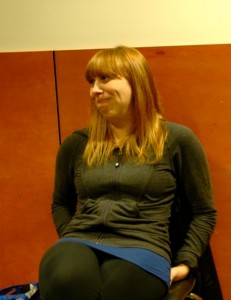
Sabrina Evertt, founder and artistic producer of Twenty-Something Theatre. (Photo by Jocelyn Gollner.)
Twenty-Something Theatre can be described as edgy, cool, provocative and definitely not your grandma’s theatre. At least, that’s what Sabrina Evertt says.
Evertt is the founder and artistic producer of the independent theatre company Twenty-Something Theatre. She describes the content and dialogue of their productions as realistic.
“It’s the kind of thing you would see or speak on the street. People see themselves in that and they can relate to it,” she says.
Productions are generally geared to 18- to 35-year-olds, with scripts that speak to the younger generation. “The transition from being a young adult in school, to real life, finding a job, finding purpose and finding love; all of those kind of things, like finding out who you are and what you want to do, are what a lot of our plays are about,” says Evertt.
Her passion for theatre started when she was around 16. All of her friends were in the drama club, so she decided to try it out. She was cast in one of the productions and she was hooked. “I think a lot of people who do theatre have a need to do it. I think you just kind of get hooked and it’s in you and you have to do it,” she says.
After high school, Evertt attended UVic and got a BFA in theatre. She says one of her biggest influences were her high school drama and improv teachers and college professors. “They helped me keep going and shaped what I wanted to do. They all just really encouraged me,” she says.
Evertt has many productions on her resumé, including both producing and directing Blue Surge, The Fever, Anne Frank Is In My Dreams, Suburbia, The Shape of Things and others. Not only is she a producer and a director, but she is also a costume designer. “I guess I’ve always had a flair for fashion and clothing”, she says. She has done the costume design for productions that include Werewolves, Hamlet, As You Like It, Banana Boys and Stuff Happens.
Currently, she is producing and directing the play Nocturne, written by Adam Rapp and featuring Troy Anthony Young. Nocturne is a one-man play, around 80 pages long, and Young has quite the challenge. It’s about a man’s journey to find closure and redemption after causing an accident that tore his family apart.
[audio:Nocturne.mp3]
Young started acting when his mother enrolled him in drama classes almost against his will. Soon, he realized he enjoyed it. “You know how most people spend time in their lives just trying to find that one thing that makes them feel right about themselves? That’s what is was for me,” says Young.
Young always hoped that one day Evertt would find a play that he could have a part in, but he didn’t expect it would be in this one and, after four years of waiting, he finally got the chance to work with her. Despite the challenges, he says it’s rewarding.
“The things I’ve seen Sabrina direct before has always been really really challenging theatre. Things you don’t see a lot of in this city. She doesn’t hire the actors you see on stage everywhere else, she gives a break to some people and gets some of the most amazing performances on stage I’ve ever seen,” said Young.
Young describes Evertt as supportive and one of the hardest working people he knows. “She could have moved to New York City and by now probably have an off-Broadway company running in the amount of time that she’s been running Twenty-Something Theatre. And she’s chosen to stay here in Vancouver, and give us a chance to get on stage and promote the people here and I think that’s one of the most honourable things in the world,” he says.
Evertt started Twenty-Something Theatre to give young actors and designers the opportunity to have careers in theatre. “I would also love to be able to financially support young people as well, as opposed to just giving them a opportunities to gain exposure,” she says.
As an independent theatre company, there are challenges.
One of the major issues facing independent theatre companies is being able to find the funding to put on the production. As a producer, that’s what Evertt spends most of her time doing. “It’s also difficult to get audiences out to see your shows, especially when your competing in this culture with TV and movies and computers and music. There’s so many options for young people,” she says.
Evertt describes Vancouver’s theatre scene as small in comparison to other places, so therefore, it’s relatively young. She mentions the big three: the Arts Club, the Playhouse and the Bard on the Beach festival. Other then that, she says, you’ve got the independent theatre companies who have been around for awhile, such as Pi Theatre, Neworld Theatre and the Electric Company Theatre.
Evertt says she would like to see Vancouver’s theatre scene take bigger risks in the material they produce. “I think that you take certain risks by incorporating technology, and that’s very interesting and that’s very different but it’s more focused on innovation and that kind of thing,” Evertt says. “I would like to see people return to telling stories, but then taking risks with those stories, like pushing boundaries and discussing topics that are relevant to today,” she says.
To learn more about Twenty-Something Theatre, visit the theatre company’s website.
What is Indie?
January 17, 2011 by Jocelyn Gollner · Leave a Comment
Where to find indie music in Vancouver (article below graphic):
Infographic by Amanda Punshon
We’ve heard about indie music, indie films, and other indie arts.
But what exactly does it mean?
It’s more than guys in tight jeans who listen to bands that no one has ever heard of.
Oswaldo Perez Cabrera is involved with the promotion and public relations for VanMusic.ca, a Vancouver-based website dedicated to giving exposure to indie bands.
He defines indie as being “all forms of art or culture that are outside of the mainstream media.”
Kwantlen students at the Richmond campus were also asked how they would describe indie, specifically indie music.
“Hmmm, that’s a good question,” said Alexandra Pastega, an English and marketing student. “Slightly acoustic. It has a kind of soft punk vibe to it in my opinion. Indie bands to me would constitute a band maybe like Metric. Kind of edgy but soft.”
Ian Nobak, a general studies student, said that indie means “independent. It would be maybe students making music, like downloading software and mixing it themselves.”
There is quite a difference, however, between a band such as Metric, which gets played on the radio, tours worldwide and has a large fan base, and students mixing music in their basement.
“There are people that start as indie and they move into more established companies,” Cabrera said. “There are other bands that prefer to keep it indie. Even some indie record companies, some indie labels, that start with a couple of bands, with their friends, and they become bigger and bigger. So then we have this question of how big they have to be to still be considered indie?”
It’s a question with no definitive answer. Everyone seems to have his or her own opinion.
But small or big, Cabrera believes that having independent artists is an important aspect to any city.
“Since [indie artists] don’t have any censorship or they aren’t subjected to what big companies are going to decide for them, it’s a very important voice to the culture of any city. It shows a little bit what the problems are in the city, it talks a bit about social issues, a lot of the time about environmental issues, they talk about what is happening in the subcultures of the city.”
He also believes that indie music is a form of resistance.
“It’s a resistance against the whole establishment. Because right now, most of radio and television, they tell you what to listen to, they tell you what to buy, they tell you how to think. And all these indie artists, it’s a resistance to all of that. Because they are talking about different things. They are talking about things that are contrary to what the establishment or what the mainstream is telling you to do. That’s a form of resistance.”
This is hardcore: Vancouver’s highly politicized DIY music scene through a founder’s eyes
January 17, 2011 by Amanda Punshon · Leave a Comment
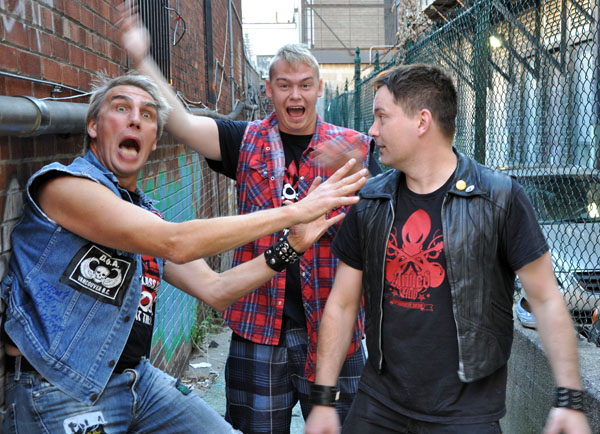
Vancouver's DOA, founding fathers of hardcore. (Photo by Diane Foy, courtesy of Sudden Death Records)
By Amanda Punshon and Meagan Gill
Hardcore music is “a bunch of people screaming their heads off, playing fast. Screaming their heads off, playing fast and playing loud,” according to Joe (“Joey Shithead”) Keithley, founding member of legendary Vancouver hardcore band DOA. Hardcore has been one of Vancouver’s most vibrant music scenes for 33 years, and DOA has been there in one form or another for all of them. In fact, the band’s second album, Hardcore ’81, which was released in April 1981, is responsible for the use of the term “hardcore” as a description of their type of punk music.
Despite being an offshoot of punk, hardcore was influenced as much by folk and metal as punk itself. Keithley counts Iggy Pop, Lead Belly, Arlo Guthrie, Jimmy Hendrix and Black Sabbath as some of the musicians that most affected DOA’s music.
Perhaps the biggest, most important reason for the spread of hardcore was the conservatism of the ‘70s and ‘80s. Politicians such as Ronald Reagan in the States, Margaret Thatcher in England, Helmut Kohl in Germany and Brian Mulroney here in Canada formed “a quartet of idiots,” in Keithley’s words, that people reacted to strongly.
The political climate may be different now, but British Columbians still take social activism seriously, which, Keithley says, is one of the reasons that Vancouver’s hardcore scene continues to thrive.
“Let’s put it this way, if you’re not politically aware, you’re probably not really a punk band,” he says. “Some of the bands are into it, and they’ll play at rallies and protests and stuff like that. Not all of them…but I mean, it’s a part of activism within the punk rock scene.”
In addition to its politics, Vancouver is known for its arts scene.
“Vancouver is a happening place, arts-wise. It’s not surprising that you’d get kids who want to do something in music, they’d move out here. They probably don’t realize how tough it is or how expensive it is but they get out here and somehow they keep working on it,” Keithley says.
And it is tough. According to Keithley, it’s incredibly hard to get a record deal because major record labels no longer have the money or the sense of adventure that they did in the 1960s and ‘70s. They’re much less likely to take a risk on a band that’s not a sure thing.
In addition to that, big record store chains are increasingly less willing to stock albums by little-known bands, Keithley says. So many hardcore bands — DOA included — start their own record labels. Others turn to the Internet to distribute their material, which, for Keithley, is a mixed blessing.
“It’s hard to be heard, or what I say, get above the ‘noise floor.’ It’s kind of hard to get noticed because the most outrageous things have been done, the most screaming’s been done,” he says. But at the same time, “it’s good, the access is there, you can make an album a lot cheaper [than in the past.]”
When DOA was starting out, hardcore bands would play alongside new wave, reggae and pop punk bands. They had to in order to fill a room. But today, Vancouver hardcore has enough of a following that the lineups for most shows are filled by other hardcore bands.
Keithley is not sure what the future has in store for hardcore music in Vancouver. “It’ll just keep growing and morphing like it always does,” he says. “There’s always going to be a new bunch of kids coming along that make their own scene. I can’t predict that.”
But one thing is certain – “people are so passionate about [Vancouver hardcore],” Keithley says. “There’s a lot of support for it…there’s love there for it, and [at the same time] the support’s not there because there’s not a lot of money. It’s coming from the heart, and that’s a good thing.”
For more Chronicle coverage of independent arts in Vancouver, click here.
Profile: Marc Stokes, busker
December 20, 2010 by Paul Fleischanderl · Leave a Comment
Busker Marc Stokes is seeing the bigger picture in what he does.
“It’s very difficult to stay in an argument with Marc Stokes,” said Anthony Madani. Madani, a hip hop performer and friend of Stokes’, is the creator of the group Musicians United Against Censorship, which is a collection of buskers, as well as musicians who felt censored by the police.
Due to noise complaints from residents, buskers were shut down by the police in spring 2010. Madani and Stokes both said they understand the concerns of the residents and Stokes added, “If you choose to live on the loudest part of Granville Street, I think it’s kind of a ridiculous statement to complain about noise down there.”
In May 2010, Musicians United Against Censorship, protested against the regulations for buskers by blocking Robson Street and making music.
Madani said that Stokes did a lot of organizing for this event and he “is incredibly passionate about his music and he loves performing and making music for people.”
Stokes is a rapper; he also plays the guitar and the saxophone. He got his musical education in elementary and high school and said his most important influences were the people at the Anza Club. There he met “a lot of people with open minds and open hearts, who are willing to teach and learn.”
David Morin is one of these people. He is singer, songwriter, guitarist and producer who is often on stage with Stokes. About Stokes he said, “Marc is very motivated […] He is just a very determined individual so it’s inspiring to work with him.”
The protest concert caught the attention of people from the Downtown Vancouver Business Improvement Association (DVBIA). According to Madani, they liked seeing live music in the streets and how well people reacted to it.
DVBIA took Stokes as a contractor for bringing more music to the streets and, as a result of their work together and with city hall, laws were changed. Busking hours and decibel levels for amplification were extended and more busking areas were created.
Barbara Fairbrother is the event-planning coordinator of DVBIA, who was and is working with Stokes. She said, “I think Marc is very passionate about what he believes in. He is open-minded and willing to listen to different groups and their concerns and I think that’s what helps him work between so many different groups.”
Looking back, Morin sees a transition in the relationship between buskers and police. “First, they [the police] were really hard on us and when they got little bit more used to what was going on they seemed to loosen up on us,” said Morin.
Guitarist Bodhi Jones, who has been a busker for five years, says he never had problems with the police or the city. “As I recall, the bans on busking only started the day the Stokester showed up,” Jones said on the group’s Facebook page in May. “It seems to me that he just likes to talk a lot of shit.”
And, via email, Jones said, “Marc Stokes and his hip hop collective do not speak for me or any of the handful of professional buskers that I’m friends with.“
When confronted with Jones’ quotes, Stokes said, “I think what the concern was a lot of people thought a lot of this was coming from me. […] About what Bodhi said, well, I mean, I’m human and I’m always gonna make mistakes and errors. I don’t know if it is possible to satisfy everybody. But I will try.”
Stokes sees the bigger picture of how life in Vancouver could be someday. He wants the mindsets of people to change. “Maybe some day it doesn’t matter anymore if you drive a BMW. Maybe someday it matters if you’re happy or not.” Stokes said he is not afraid to take the small steps along the way. However, the power for the small and big steps lies in his passion for making music for people.
Stokes in Downtown Vancouver on July 1, 2010. (YouTube video by user woodwardsmile)
Stokes’ website: www.un1music.com
Video: Anosh Irani has a way with words
October 27, 2010 by Jeff Groat · 1 Comment
Indian-born author Anosh Irani appeared at this year’s Vancouver International Writers and Readers Festival, and read from his new novel, Dahanu Road. The reading took place at an event called Home Grown, which featured several Vancouver-based authors and poets. Irani moved to Vancouver from Mumbai, India in 1998 to study creative writing at UBC. In 2009, he was writer-in-residence for Kwantlen’s creative writing program. He has has received a number of Canadian literature awards for his plays, novels and poetry.
Video by Jeff Groat and Amanda Punshon
February 11, 2010 by mark · Leave a Comment First-year journalism students are covering the Olympic Torch Run, as it moves through Vancouver today (Thursday). This is the first of what will be several slideshows showing the run and the students’ work. February 9, 2010 by mark · Leave a Comment Note: the slideshows are actually appearing here.The Olympic Torch run in photos
Thursday: Following the Olympic torch run
On Thursday, Feb. 11, first-year journalism students will be following the Winter Olympic torch run as it enters Vancouver, from Burnaby, and makes its way across the city. The slideshow of their work will be updated throughout the day, beginning in the early afternoon.

